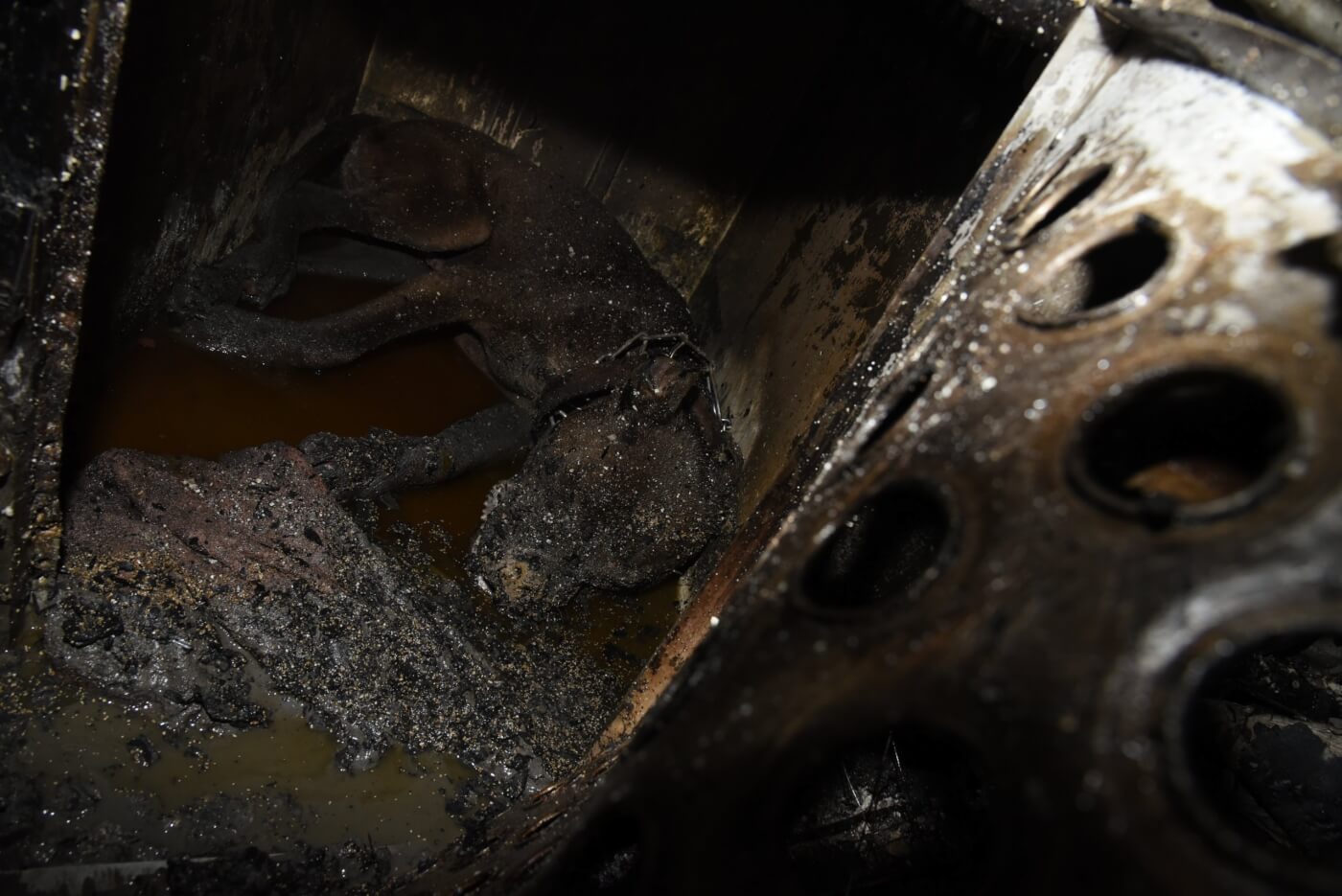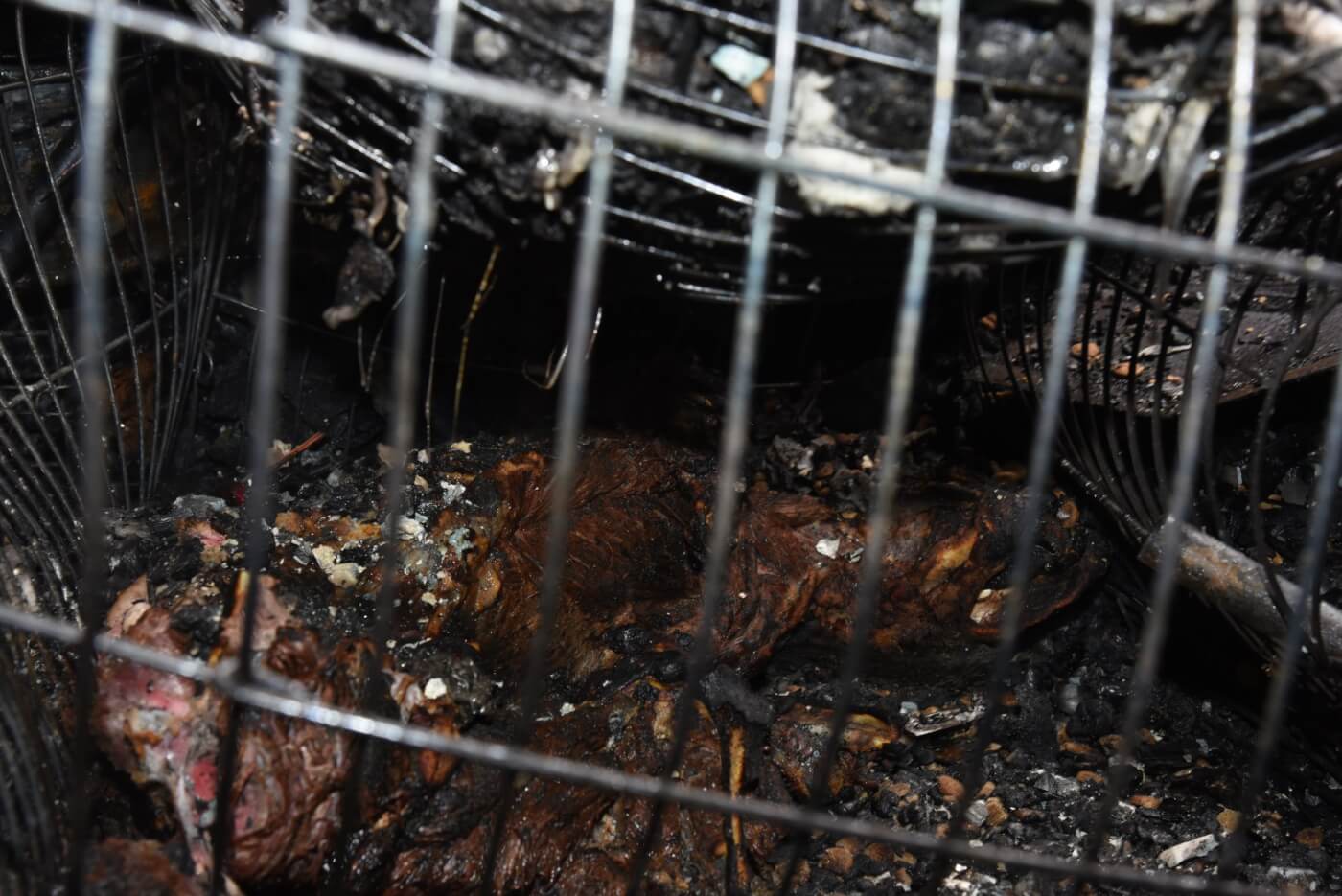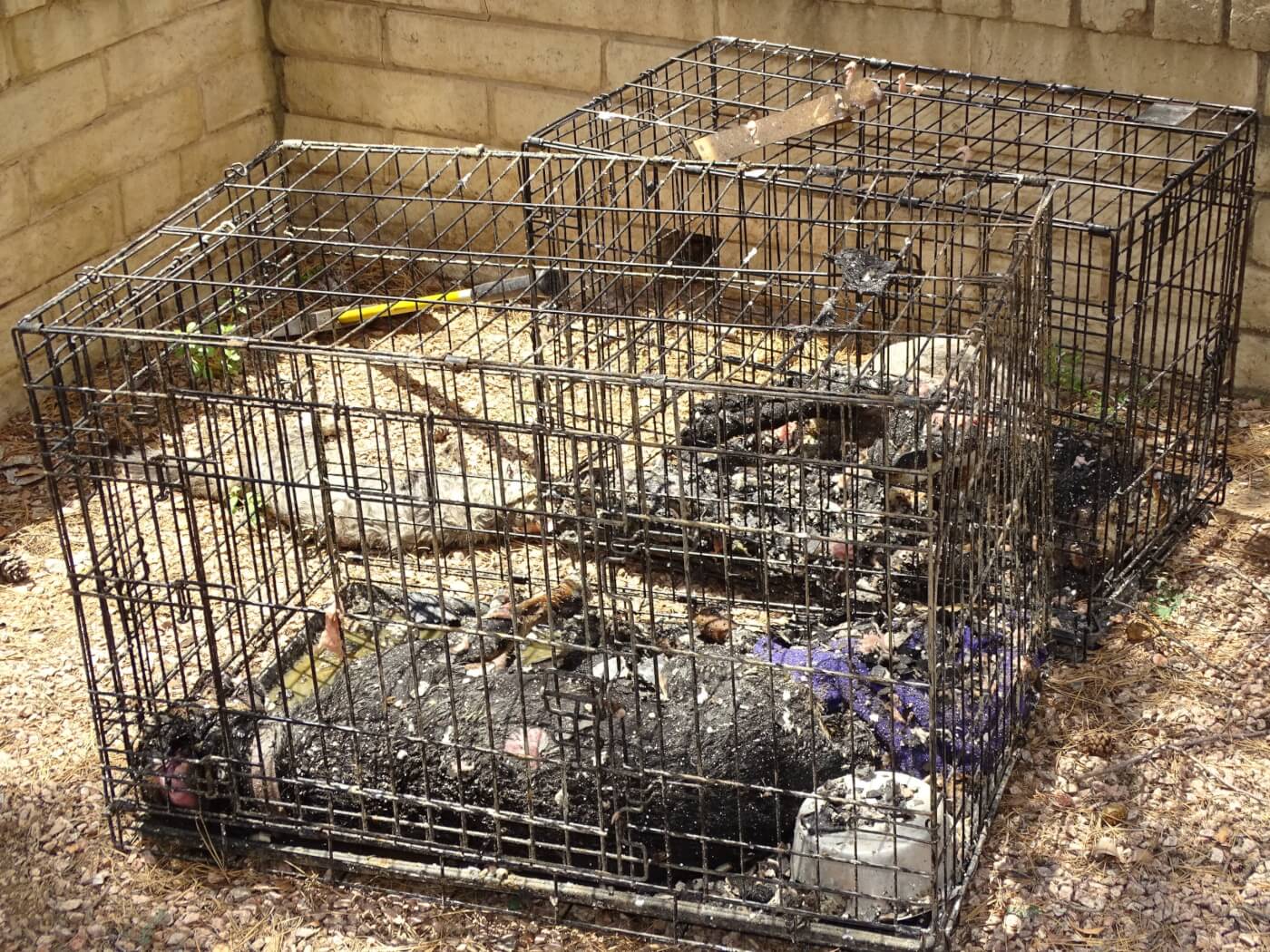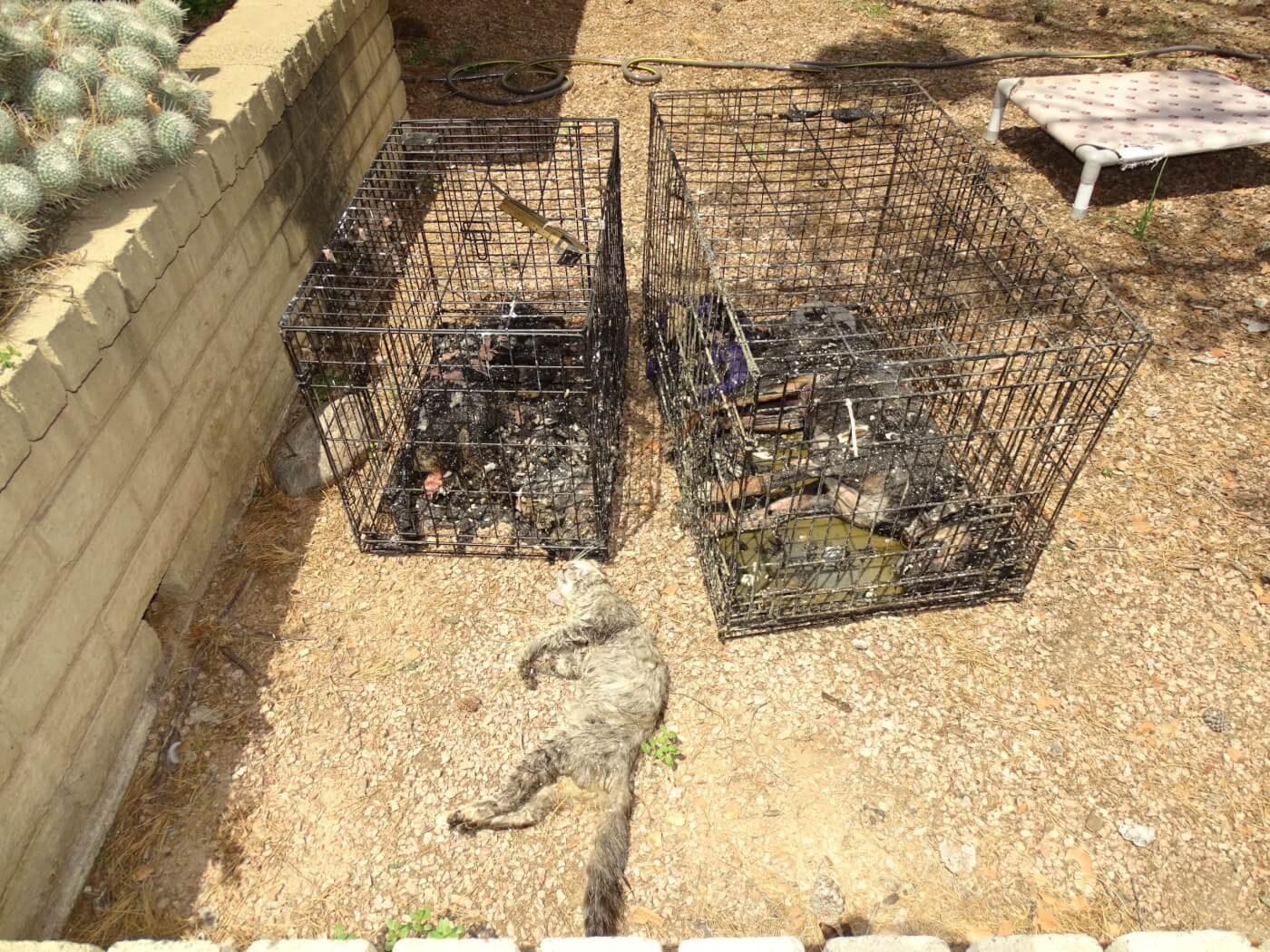More Than 100 Animals Have Died in Fires Recently, and the Reason Why Might Surprise You
(Warning: graphic images)
It’s hard to imagine a more terrifying and painful way to die: Trapped inside a crate with no possibility of escape, a pit bull surely spent his last moments barking frantically, clawing at the crate, and gasping for air as thick black smoke choked his lungs. As the inferno raged closer, consuming other caged dogs in its path, the plastic crate began to melt, dripping down onto his head and back. Finally, in a rush of searing heat, flames engulfed him.
This dog was one of 29 who burned to death inside a dismally filthy hoarding facility near Chicago doing business as Bully Life Animal Services. PETA obtained photos from the crime scene showing the dogs’ charred corpses locked inside cages—including one who was still wearing a painful prong collar. DuPage County State’s Attorney Bob Berlin summed up the ghastly situation by saying, “These dogs lived in cruel and inhumane conditions, and they died a horrible death.”


‘No-Kill’ Fans the Flames of Hoarding and Neglect
This horrific case is far from an isolated incident. In the past few weeks alone, more than 100 animals have died in fires at facilities that call themselves “rescue” groups across the U.S.
Many groups and individuals who claim to “save” animals by “pulling” them from animal shelters are actually hoarders who keep massive numbers of animals in crowded, filthy conditions and deprive them of adequate food, water, sanitation, exercise, and veterinary care. “Rescue” groups constitute one quarter of the estimated 6,000 new hoarding cases reported in the U.S. each year.
Why do fires occur so frequently at these facilities? Because fire hazards are rampant at such facilities. A review by the Hoarding of Animals Research Consortium found that 70% of animal-hoarding cases included fire hazards.
Some of these fires are suspicious and/or are followed by fundraisers that request (and often obtain) large sums of money, in addition to insurance claims. But no amount of money can compensate for the terrible suffering of animals who die in these fires, such as the dogs who apparently burned to death inside cages at a hoarding facility in Chandler, Arizona, called Cruz’s Crusaders. Allegedly, 40 dogs were confined there and at least 13 of them were killed in the blaze.


There have been many other cases like these. Here are just a few that have made headlines in recent weeks. Keep in mind that many are never reported, so these examples may represent just a small percentage of them.
- Marion, North Carolina: At Rusty’s Legacy, a mother dog and 11 puppies were reportedly killed after a fire broke out. The group claimed that “it appears a wire shorted out and caught a tarp on fire, which then engulfed the entire kennel in flames.”
- Hallsville, Missouri: Around 30 dogs at Little Rays of Sunshine Animal Rescue were reportedly killed when the building confining them became engulfed in flames and the roof caved in.
- Richland Center, Wisconsin: More than 20 animals were killed in a fire at the home of the owner of Richland Area Rescue.
- Waxhaw, North Carolina: Four dogs, a goat, and an unspecified number of chickens were reportedly killed in a barn fire at Rover’s Rescue & Retreat. Authorities apparently believe that heat lamps may have fallen onto the straw, starting the fire.
- Marked Tree, Arkansas: Five cats and two dogs reportedly died in a fire at the home of a volunteer for Marked Tree Animals Rescue. Approximately 20 dogs and cats from the home were reportedly taken to a veterinary hospital. Three cats were so badly injured that they required “being dry wrapped on their face and feet for burns” and had to be placed in “oxygen boxes.” One cat evidently died at the hospital despite treatment.
- Silverton, Oregon: It took more than 30 firefighters to battle a blaze that killed 30 cats at Silverton Cat Rescue, according to a news report. The owner said that seven cats had reportedly been retrieved alive and “others may be scattered around the neighborhood.”
- Prestonsburg, Kentucky: Ten dogs were killed after a fire broke out at the home of a woman who had reportedly fostered animals for an unnamed self-professed “rescue” group in Canada.
Animals are entirely vulnerable, and those without homes depend on shelters to protect them and act in their best interests. It’s vital that authorities ensure that any groups or individuals who claim to “save” animals by removing them from shelters aren’t subjecting those same animals to cruel and deadly fates, such as starving to death, fatal neglect, or bleak lives inside cages with no hope of escape if a fire or other disaster occurs.
You can help prevent animals from ending up in abusive, neglectful, and deadly situations. Here’s how:
- Meet with the director of your local animal shelter to share this information and urge them to investigate thoroughly and require regular inspections of all adoption groups—including their foster homes—where animals are transferred. If a group operates in another city or state, the shelter should work with authorities in that community to investigate the group and conduct regular inspections of it.
- Also urge your local shelter to implement rigorous safeguards and screening methods in order to help protect any animals it releases to individuals or entities and request that it use a bulletproof transfer agreement requiring that animals be returned to it if the releasing agency can no longer care for the animals for any reason.
- Never donate to or leave animals with any group or individual you haven’t thoroughly investigated and visited. See the end of this post for tips on what to look for.
- Never promote random shelters or groups by “liking” or sharing their social media content if you haven’t thoroughly investigated and visited them.
- Contact your state and local legislators and urge them to pass commonsense and badly needed safeguards to protect homeless animals. Feel free to use the sample letter provided here to urge them to take action. Find your legislators here.
Sample Letter
Dear [Title] [Name]:
I was shocked to learn of numerous reports of animals being hoarded, neglected, and abused—sometimes fatally—at unregulated, self-professed “rescue groups.” These facilities often claim to “save” animals from being euthanized in public animal shelters, yet many keep animals in criminally cruel conditions, causing them to suffer and die in horrific ways.
I urge you to introduce legislation to establish minimum standards of care for shelters and adoption groups, require inspections of these facilities as well as their foster homes, require that groups make documentation available regarding the whereabouts of all animals in their custody, and require sterilization and veterinary examinations and care of animals released to and from such groups.
Putting these commonsense safeguards in place would help protect vulnerable animals from being exploited and killed by the very groups that claim to “save” them. Thank you for your time and attention to this urgent matter.
Sincerely,
[Name]
- Read PETA’s open letter to shelters, and share it with everyone you know.

